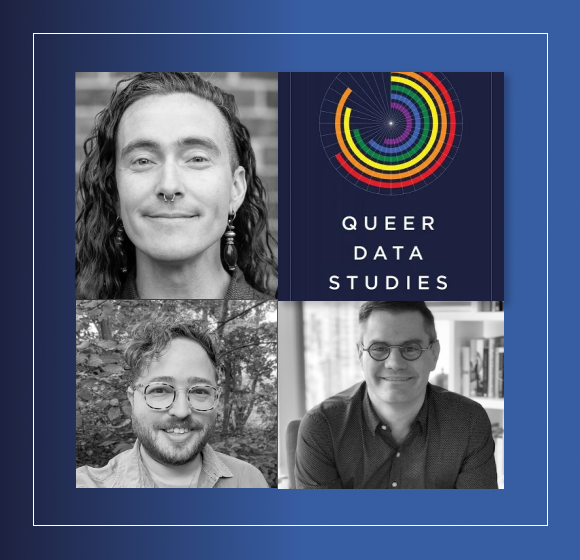“For queer communities, as it is for many marginalized communities, data is a double-edged sword. There are vulnerabilities that come from being counted, from being surveilled, from being included, but there are also harms from being excluded, from not being counted.”
– Nikita Shepard
“What if we queered data by taking some of these queer data points more seriously? I’m not sure if I want algorithms or AI to be fed and run off [those points], but I’m also curious what it would be like if they did. Or if we used our astrological signs as a jumping off point rather than our last 10 purchases or things like that. And that’s also not to say that those data points aren’t being used—maybe they are already. But what if we weighted them differently?”
– Harris Kornstein
Description
Sometimes all we want is to be seen. Queer people have long been rendered invisible by data systems: survey questions that impose gendered binaries, inquiries that dismiss queer subjects as unimportant or insignificant, and ahistorical erasures of queer life that push queer experiences and knowledge further into the margins. Yet visibility also comes with risk. Digital and biomedical surveillance, personal data breaches, and privacy concerns arise when indications of queerness, real or otherwise, are present and unprotected in datasets. The threat imposed by interlocking systems of anti-queer violence and oppression seeds movements away from visibility and towards fugitive tactics of refusal — a kind of strategic invisibility.
On February 15, Nikita Shepard and Harris Kornstein discussed this problem of data in/visibility as they explored it in their contributions to Queer Data Studies, an anthology edited by Patrick Keilty featuring essays that examine, from a range of disciplinary approaches, how data impacts queer subjects. With an introduction from Keilty, in a conversation moderated by Data & Society Research Analyst Joan Mukogosi, Shepard, Kornstein, and Keilty broke down the dichotomy between visibility and opacity of queer subjects in data, and engaged in the generative practice of thinking about data from and through queerness.
In Queer Data Studies, authors adopt a range of analytical approaches to understanding the impact of data systems and practices — extraction, circulation, modeling, and governance — on queer subjects. With essays drawing from a range of disciplines including queer theory, science and technology studies, history, and Black studies, the anthology offers a rich examination of the contradictions, limits, and possibilities of “queer data.” Kornstein’s chapter considers the ways queer people are uniquely positioned to both critique data harms and accept the thorny politics of various data infrastructures. Shepard’s chapter explores a curious case of queer advocacy for data evasion, historicizing surveillance and offering insight into contemporary data activism.
Speakers

Nikita Shepard
Nikita Shepard (they/them) is a historian of LGBTQ communities, gender/sexuality and race, social movements, data and surveillance, the carceral state, and radical politics in the twentieth-century United States and beyond. Their ground-breaking essay “‘To Fight for an End to Intrusions into the Sex Lives of Americans’: Gay and Lesbian Resistance to Sexual Surveillance and Data Gathering, 1945-1972” appears in Queer Data Studies and won the 2022 Gregory Sprague Prize from the American Historical Association’s Committee on LGBT History. Shepard’s forthcoming doctoral dissertation traces a political history of the public bathroom and the social movements that have contested access to it in the modern United States. Their teaching work has spanned US history, gender and sexuality studies, social theory, histories of sexuality and of technology, critical data studies, and more. They serve as a 2023-24 graduate fellow at Columbia’s Institute for the Study of Sexuality and Gender and have collaborated with the Barnard College Empirical Reasoning Center in their “Getting Critical with Data” series. Shepard’s writings have appeared or are forthcoming in publications including The Washington Post, GLQ, The Oral History Journal, Information and Culture, Social History, Black Perspectives, Reviews in Digital Humanities, and Spectrum South.

Harris Kornstein | Twitter (X): @LilMissHotMess
Harris Kornstein is a scholar and artist whose research and art practice focuses on digital culture, surveillance, data and algorithms, media art/activism, visual culture, disability, and queer theory. Their current book project, Enchanting Technology: Obfuscation, Play, and Other Queer Strategies for Countering Surveillance Capitalism, documents queer and trans cultural strategies that mobilize techniques of play, misuse, and obfuscation to counter the harms of surveillance capitalism — a process they theorize as “queer enchantment.” They are co-editing the anthology How To Be Disabled in a Pandemic (NYU Press), which analyzes the experiences of disabled New Yorkers during the ongoing Covid-19 pandemic.
Kornstein’s research has been published in Surveillance & Society, Curriculum Inquiry, and several edited books; their writing on digital and queer cultures has appeared in publications including The Guardian, Wired, and Salon. As a media artist, curator, and drag queen, they have presented work at the San Francisco Museum of Modern Art, Institute for Contemporary Art in Los Angeles, ONE Archives, and numerous other universities, galleries, and festivals. Kornstein is an assistant professor in the University of Arizona’s Department of Public & Applied Humanities, and is currently on research leave as part of a National Endowment for the Humanities fellowship.

Patrick Keilty | Twitter (X): @PatrickKeilty
Patrick Keilty is associate professor in the Faculty of Information and Cinema Studies Institute at the University of Toronto. His research interests can be divided into two areas: the politics of digital infrastructures in the sex industries and the materiality of sexual media.
Host
Resources
References
- On Queer Data Studies’s origins – Patrick was thinking about the politics of data, queer histories, and the genealogical data to be drawn from queer data:
- Lab | Technoscience Research Unit at University of Toronto
- Event | Guerrilla Archiving: Saving Environmental Data from Trump (2017)
- On algorithmic triangulation: Dragoș M. Obreja, “When Stories Turn Institutional: How TikTok Users Legitimate the Algorithmic Sensemaking”, Social Media + Society (2024)
- Harris on queering existing models and systems:
- Bonnie Ruberg, The Queer Games Avant-Garde: How LGBTQ Game Makers Are Reimagining the Medium of Video Games, Duke University Press (2020)
- Sarah Ahmed, What’s the Use? On the Uses of Use, Duke University Press (2019)
- Kara Keeling, “Queer OS”, Cinema Journal Vol. 53, No. 2, 152-157 (Winter 2014)
- Harris Kornstein, “Queer Enchantment: Contours, Cruising, Crystal Visions, and Other Queer Tactics for (Not) Being Seen” New York University ProQuest Dissertations Publishing (2021)
- Finn Brunton and Helen Nissenbaum, Obfuscation: A User’s Guide for Privacy and Protest, The MIT Press (2016)
- Harris Kornstein, “Screen Queen Face Fail”, Harris Kornstein
- Didem Özkul, “The algorithmic fix: Location intelligence, placemaking, and predictable futures”, Convergence: The International Journal of Research into New Media Technologies (2021)
Readings
- José Esteban Muñoz, “Ephemera as Evidence”, Women & Performance: a journal of feminist theory (1996)
- Saidiya Hartman, “Venus in Two Acts”, Duke University Press (2008)
Credits
Curation: Ireti Akinrinade
Production: Tunika Onnekikami
Web Support: Alessa Erawan
Design: Gloria Mendoza
Editorial: Eryn Loeb
Additional support provided by Data & Society’s Engagement and Accounting teams.


